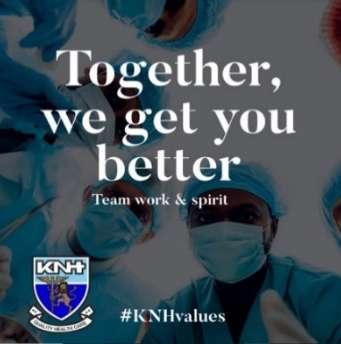
4 minute read
The power of high-performing teams: How to build and sustain a winning culture
Unpacking the KNH core values on teamwork and team spirit
By Carol Lang’at
Advertisement
In today’s fast-paced and highly competitive business landscape, high-performing teams are essential for success. These teams are made up of individuals who work together cohesively, each member contributing their unique skills and expertise to achieve a shared goal. Building and sustaining a winning culture isn’t a walk in the park. It takes strong leadership, clear communication, and a commitment to continuous improvement.
The KNH culture is shaped by six fundamental values, including a strong emphasis on teamwork and team spirit. These values are ingrained in the very fabric of our organization and represent our fundamental principles and identity. For KNH, teamwork, and team spirit are essential components that promote collaboration and coordination among our staff, working together towards a shared goal of advancing the hospital’s mission.

Teamwork and team spirit are essential elements for any organization to achieve its goals and objectives. When a group of individuals comes together, with a common purpose and a shared vision, they can achieve extraordinary results. Highperforming teams are critical to the success of any organization, and they are the driving force behind innovation, growth, and success.
To build a high-performing team, it is crucial to have a clear idea of what one looks like. A highperforming team is distinguished by its strong collaboration, effective communication, shared sense of purpose, and unwavering commitment to excellence. Such a team comprises highly skilled and motivated individuals who work together towards a shared objective. Therefore, having a clear understanding of what constitutes a high-performing team is the first step toward creating one.
Trust is the foundation of every successful team, and it plays a pivotal role in building a highperforming one. Without trust, team members may feel hesitant to share their thoughts, voice their concerns, or take risks. To establish a culture of trust, leaders must foster transparency, promote open communication, and create a safe space where individuals feel comfortable being vulnerable.
In addition, team leaders must lead by example, exhibiting the attitudes and behaviors they want to see in their team. When trust is present, team members are more likely to share their ideas and opinions without fear of judgment. They feel heard and valued, and they are willing to take risks and collaborate toward shared goals. Effective communication is key to the success of any team, and it becomes even more vital for highperforming teams. Members must be able to freely express their ideas, provide and receive feedback, and collaborate effectively. To foster open communication, leaders must create a supportive environment that encourages everyone to share their thoughts and ideas. Every team member should have a voice and feel heard. Regular feedback should be provided, and constructive criticism should be promoted to facilitate growth and development.
Clear goals and objectives. Successful teams share a common understanding of their purpose and goals, with each member having a clear understanding of what they are working towards. The team’s objectives are in line with the broader vision and mission of the organization, contributing to its high performance.

Diversity. Innovative solutions often emerge from teams that embrace diversity, comprising individuals with distinct personalities, skills, and backgrounds. Such teams benefit from a wider range of perspectives and ideas, contributing to their high performance. Additionally, trust and respect are key elements of their culture, with team members feeling confident in expressing their thoughts and opinions, confident that they will be appreciated. With each member bringing a unique set of skills and strengths to the table, high-performing teams comprise individuals with complementary skills aligned with the team’s goals.
High-performing teams prioritize accountability and responsibility, taking ownership of their performance and outcomes. Every member assumes responsibility for their role, and they collaborate to guarantee the team’s triumph.
In situations where obstacles and setbacks arise, high-performing teams exhibit resilience by leveraging their exceptional communication and collaboration skills to overcome challenges and progress. This determination distinguishes these teams, empowering them to accomplish great feats for the organization.
In summary, the significance of high-performing teams cannot be overstated when it comes to organizational success. By cultivating these attributes within your team, you can foster success and realize your goals.
For KNH, this means achieving the goal of becoming a world-class patient-centered specialized care hospital.










